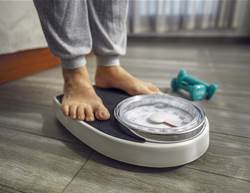Forget overhauling everything. Even the tiniest changes can deliver a major wellbeing boost if you regularly seed them through your daily routine. The proof? These quick health hacks —direct from dietitians, trainers and more.
1. Do a body scan
Examine your body position periodically and straighten up. Once in the habit, you'll feel more alert and energised. Slouching can sap energy because it strains your neck, back and hips and compromises oxygen flow to the brain, says Dr Holly Phillips, author of The Exhaustion Breakthrough. When you're standing, make sure your head and ears are directly above your shoulders, your shoulders are in line with your hips, and your hips are in line with your knees and feet. When you're seated, your head and neck should be above your shoulders and your shoulders in line with your hips.
2. Go for a morning walk
A brisk walk first thing in the AM is proven to help you stay more active, alert and focused all day long. Set your alarm 30 minutes earlier. You won't regret it.
3. Toss a cup of epsom salts into your bath
Take your bubble bath to the next level of restorative goodness with these tiny but mighty salts. Once dissolved in water, they're absorbed by the skin and help replenish your body's magnesium levels, an essential mineral that can be depleted by stress.
4. Stop and squeeze
Instead of daydreaming about winning the lottery while waiting for the light to change, perform some Kegel exercises. These moves slowly contract and release the muscles that control the flow of urine. Doing Kegels regularly can help prevent bladder leakage, stress incontinence and pelvic organ prolapse and may improve sexual response, says Dr Jill Maura Rabin, a professor of obstetrics and gynaecology. Aim for one set of five to 10 reps, ideally 10 times a day.
5. Peek at your pee
Many women walk around slightly dehydrated, and the colour of your urine can tell you if you're one of them, says Dr Rabin, who's also the author of Mind Over Bladder. Ideally, it should be pale yellow and clear. If it's bright yellow or dark, start by adding a few more cups of liquid throughout the day and increase from there until your pee is pale.
6. Vegify your meal
Cooking up a bolognese, stew or hearty soup? Try 'vegifying' your meal by swapping the meat for legumes. Researchers at Arizona State University Polytechnic found that adding 1/2 cup of beans to soup lowers total cholesterol, including LDL, by 8%. The key to this heart-healthy food is its abundance of fibre, which has been shown to slow the rate and amount of absorption of cholesterol in certain foods. Try kidney or cannellini beans; each supplies about one third of your daily fibre needs.
7. Try 'snacktivity'
'Snacktivity' refers to bite-sized workouts that you can scatter throughout your day to satisfy your body just as much as one long exercise session. An Australian study from 2022 found that one-minute bursts of intense activity performed three or four times a day can boost overall health to reduce the risk of premature death by up to 49%. That's impressive! How do you do it? Any movement counts, but try to incorporate all styles of movement, including cardio, strength and stretching. Aim for 30 minutes of intense activity per day, broken up into six five-minute sessions or three 10-minute workouts, or mixing and matching. Go for a speedy walk during lunch (your heart rate must be up and conversation a tad difficult!), climb up and down a few flights of stairs, or even do some star jumps or squats in the office kitchen while waiting for your tea to brew.
8. Strike a pose
A yoga pose, that is, which will help boost blood flow to the brain and stretch a tight spine, says yoga instructor Elissa Lappostato. Ground your feet by pressing into all fours of each sole, bend your knees and fold forward from the hips with a straight back. Hang for 10 - 20 breaths and then slowly rise back up.
9. Top your salad with salmon
Getting tired of tuna? Consider this your impetus to mix it up. Canned salmon packs more than twice the amount of omega-3. And research proves getting more of this super nutrient is a very good thing. Eating omega-3 rich fatty fish at least twice weekly lowers the risk of hearing loss in women by 20% and bolsters the entire cardiovascular system.
10. Give your eyes a break
Try this simple technique to give your tired eyes a speedy pep up. Rub your hands together to warm them up. Rest your elbows on a table and cup your hands over both eyes, with the heels of palms on your cheeks. Take a few deep breaths, then move your hands higher and gently apply light pressure with your palm. Hold for a moment, then release.
11. Stretch your legs
Tight leg muscles from your last gym workout? Get into the habit of stretching and you'll not only improve flexibility, you'll also build strength, according to a study in the Clinical Journal of Sports Medicine. Stretching loosens tight muscles, allowing for an increased range of motion.
12. Stop and smell the roses
Consider this your instant pick-me-up: sprinkle four or five drops of your favourite essential oil on a tissue and hold it to your nose, taking 10 to 15 deep breaths. Feeling upset? Reach for lavender. "Studies show it's one of nature's best sedatives," says aromatherapist Hope Gillerman. Lying awake at night? Try vetiver, frankincense, myrrh or clary sage. "These oils will slow you down and promote a heavier, more restorative sleep."
13. Dry brush your body
Try this speedy self-care ritual for glowing skin, better circulation and an instant energy boost: before your next shower, start at the tops of your feet, working up the body and brushing with long, straight strokes in the direction of your heart. Each stroke should take around two seconds, skipping the delicate skin on your face, neck and decolletage. It brings blood to the surface and fires up your lymphatic system.
14. Get nostalgic
Taking a mental stroll to your happy place by intentionally recalling a positive autobiographical memory for one minute can help with mood regulation, according to a US study. During your next grumpy spell, recall a pleasant memory to trigger activation of parts of your brain that could make you feel a whole lot better.










